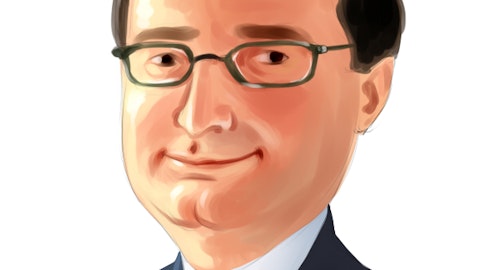Recently, shares of Philip Morris International Inc. (NYSE:PM) declined below $80 per share. This was significant, because it pushed Philip Morris’ dividend yield to above 5%. In an investing climate of historically low interest rates and record high stock prices, a 5% dividend yield is a rare find nowadays. The S&P 500 provides a dividend yield less than 2% on average, which makes it difficult for investors to locate high dividend yields.

Even when an investor does come across a very high dividend yield, it’s often a sign of danger. A sky-high yield could be the result of a deteriorating business. Many times, an abnormally high yield is a precursor to a dividend cut. This means investing in high yields can be a dangerous game.
But when it comes to Philip Morris, investors should not be concerned about the dividend. The company generates more than enough cash flow to sustain its generous payout, thanks to the excellent underlying economics of the tobacco business. And, Philip Morris is taking extra precautionary steps this year to improve its finances and cut spending to protect the dividend even further.
Significant Competitive Advantages
Philip Morris International Inc. (NYSE:PM) was spun off in 2009 from its former parent Altria Group Inc (NYSE:MO). Philip Morris operates the Marlboro brand in international markets. The company was freed from Altria so that it could grow as an independent entity, and not be encumbered by the stricter regulatory environment in the United States. This gives Philip Morris an advantage, because the international markets are growing at a faster rate than the U.S., particularly in the global emerging markets. For example, Philip Morris enjoys 27% market share in Russia, and 35% in Indonesia.
The tobacco business is an extremely profitable one. Companies enjoy massive scale through lean manufacturing and distribution. Capital expenditure requirements are very low. And, the product being sold is literally addictive, which lends itself to substantial pricing power over the consumer. This is why many tobacco companies can pay such high dividend yields to shareholders, and even grow those dividends over time. Philip Morris generated $6.5 billion of free cash flow just last year. This was more than enough to cover its dividend, which cost the company $6 billion in 2014.
Philip Morris’ fundamental improvement accelerated to start 2015. In the first quarter, its cigarette shipment volume grew by 1.4% year over year. Revenue and earnings per share declined 4% and 1%, respectively, but much of this was due to unfavorable currency fluctuations. The strengthening of the U.S. dollar over most other currencies is a major headwind for companies that do business in international markets, and that certainly includes Philip Morris. In fact, excluding foreign exchange effects, revenue and EPS would have increased by 9% and 24%, respectively.
Opportunities For Continued Growth
Philip Morris enjoys a dominant industry position. Its market share gained 0.3 percentage points to start 2015, and now sits at 28.6% across the world excluding the U.S. and China. In 2014, Philip Morris held the number one or number two positions in 29 out of the 40 largest markets by industry net revenue. Overall, it owns six of the top 15 international cigarette brands, which include Marlboro, L&M, Parliament, Bond Street, Chesterfield and Philip Morris, all of which increased their market share to start this year.
Looking forward, it’s likely Philip Morris’ fundamentals will improve further from here. First, the company has new ‘reduced-risk’ products, such as e-cigarettes, that should contribute to future growth. These e-cig products are called iQOS and Marlboro HeatSticks, which were recently introduced in Nagoya, Japan, and Milan, Italy. Management believes these new products offer a unique and more enjoyable consumer experience, as they focus on innovation and product convenience benefits, such as no ash and less smell. Furthermore, these products heat tobacco rather than burn it, which could be a safer alternative to traditional cigarettes. Preliminary results have been positive, enough so that management plans national roll-outs in those two countries. If all goes well, these products will then be shipped to additional markets later this year.
Dividend Remains Secure
Philip Morris International Inc. (NYSE:PM) is seeing revenue and earnings suffer because of the strong U.S. dollar and weakening Euro zone. But the underlying business remains strong, and the company is taking the necessary steps to cut spending while times are tough. For example, Philip Morris will not buy back stock this year, which cost the company about $3.8 billion last year. In addition, it will reduce spending. Last year alone, it reduced its cost structure by $300 million, with further productivity measures in place this year. These include enhancing production processes, harmonizing tobacco blends, and supply chain improvements. Andy Brown’s Cedar Rock Capital has a huge $900 million position in the stock.
Follow Andy Brown's Cedar Rock Capital
For these reasons, management expects 2015 free cash flow is expected to be roughly in-line with last year’s free cash flow. Meanwhile, Philip Morris expects $4.32 per share to $4.42 per share in profit this year. This can easily cover its $4 per share dividend. As a result, it appears Philip Morris’ 5% dividend is secure. Philip Morris’ unique mix of high yield, stable cash flows, and solid growth prospects make it an excellent choice for any investor looking to add to their dividend growth portfolio.
Disclosure: This article is written by Bob Ciura. He doesn’t hold any shares of PM.





